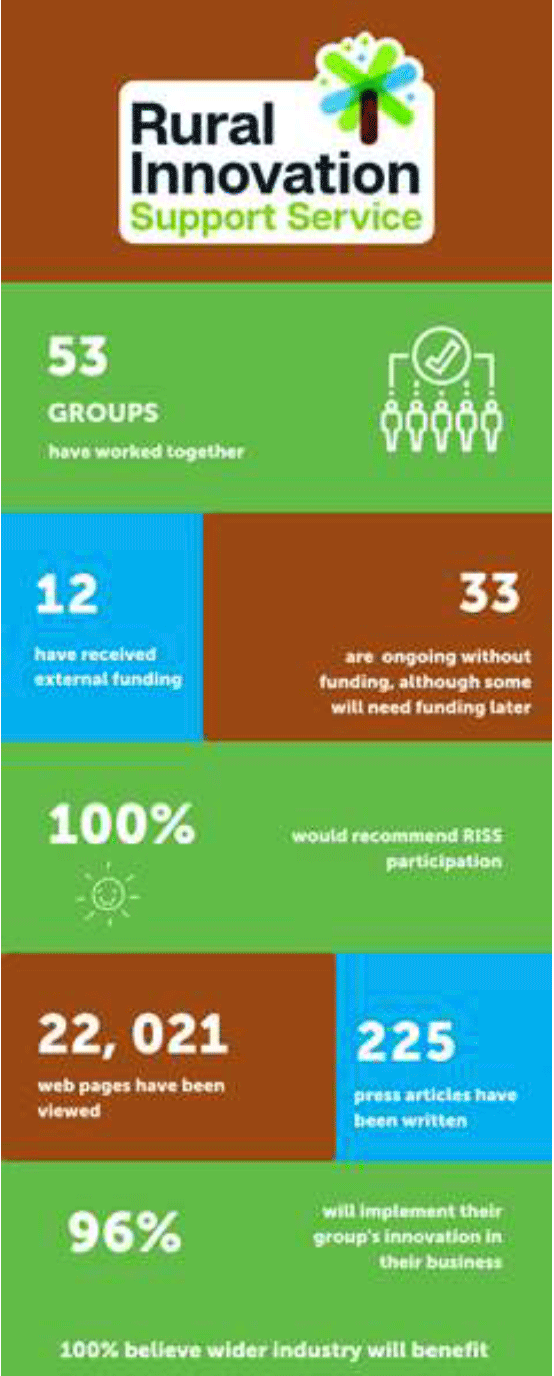Scottish Rural Development Programme 2014-2020: ex-post evaluation - main report
This report presents findings from an independent ex-post evaluation of the Scottish Rural Development Programme (SRDP) 2014-2020. The report answers the European Commission’s 30 Common Evaluation Questions (CEQs)
33. Fostering innovation
This chapter answers CEQ30: To what extent has the RDP contributed to fostering innovation?
Response
The definition of ‘innovative’ matters to the interpretation and answer to this over-arching question. Scheme managers and the evaluators both take the view that it can include both innovation at the industry level (new products, new processes, etc.) and at the farm level, when operators initially some way behind the leaders are brought somewhat closer to the production possibility boundary.
The answer to CEQ 1 dealt explicitly with innovation in rural areas. The conclusion was that there has certainly been considerable effort in the design of the SRDP 2014-2020 to support innovation. This was seen most clearly in the set of KTIF projects – of greatest note here were the 27 EIP operational groups which were supported through the KTIF by the end of the Programme.
Many examples exist too within the FAS of attempts to encourage individual farmers to take up improvements in the way that they operate their farms, through tools that ranged from lighter touch one-to-many activities and events through to more in-depth one-to-one advice. The FAS also attempted to encourage farms to take up new ways of operating. Advice was also offered via other SRDP schemes, such as the BES.
An attempt was also undertaken to improve the link between the generators of research and innovation and the agricultural, food and forestry community, thereby assisting the rate of flow of ideas that are the basis of innovatory behaviour (see CEQ 2).
Lifelong learning, which implies innovation at the level of the individual, was embedded in much of the SRDP 2014-2020, especially in the activities under KTIF, and this learning is likely to be a vehicle for innovation in agricultural businesses (see CEQ 3). Modernisation and agricultural diversification often go hand-in-hand with innovation (see CEQ 4).
There were also examples of innovative approaches to the delivery processes of schemes, projects, etc. throughout the SRDP 2014-2020. A good example was the SRN supported initiative RISS, which helped farmers, foresters and crofters find practical, sustainable solutions to everyday challenges affecting their business (for example, supply chain issues, technology).
RISS was part of the SRN and led by the Soil Association Scotland, with involvement of other delivery partners such as SAOS, SAC Consulting, Innovative Farmers, and Scotland Food and Drink.
RISS recognised that farmers often know what is right, or what might be right, for their business, but they often do not have access to the right people to make their idea happen, capacity to try something new and fail, or time to bring a project together.
The scheme provided professional support to farmers interested in trying new things and connected them with the right people who helped them develop a viable project. A facilitator from a partner organisation was allocated to work with a group to scope existing work, explore options, bring in the right people, organise meetings and get the group to an actionable project plan, at which point RISS would bow out. The group would then use the project plan to either to apply for funding or get started.
In this sense, innovation within RISS was very much about groups of people working together, testing ideas to get to the heart of the problem, and going through a process to find feasible, sustainable solutions.

Infographic text:
- 53 groups have worked together
- 12 have received external funding
- 33 are ongoing without funding, although some will need funding later
- 100% would recommend RISS participation
- 22,021 web pages have been viewed
- 225 press articled have been written
- 96% will implement their group’s innovation in their business
- 100% believe wider industry will benefit
EKOS conclusion
A key problem in relation to innovation was a lack of evidence at this stage with which to understand the outcomes and impacts of the activities undertaken. This means that, while it is possible to conclude that the SRDP 2014-2020 should have had positive impacts on innovation, it was not possible to conclude that this has actually occurred. That said, it is acknowledged that efforts are being made through various planned evaluations, and through the internal efforts within certain elements of the SRDP to gather an evidence base for future use.
Contact
Email: SRDPevaluations@gov.scot
There is a problem
Thanks for your feedback